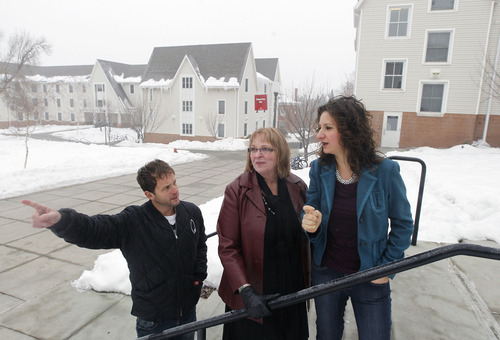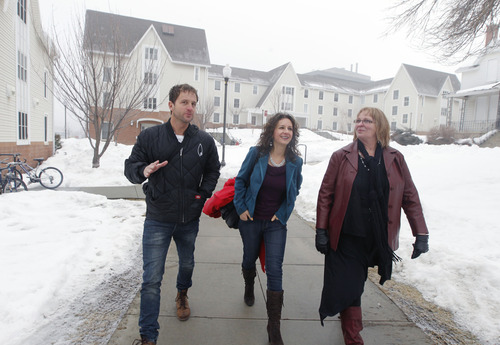This is an archived article that was published on sltrib.com in 2013, and information in the article may be outdated. It is provided only for personal research purposes and may not be reprinted.
A plan to provide more housing for the ever-expanding Outdoor Retailer Summer Market could end up conserving prime real estate in the Wasatch Mountains.
It works like this:
A company called My Convention Housing is working to secure 1,000 beds in University of Utah residence halls for use by Outdoor Retailer visitors, starting this summer. It also is looking for another 6,500 to 7,500 beds in nearby private homes and apartments for a "host housing" program to accommodate OR's overflow crowd.
My Convention Housing expects to donate about 10 percent of its profits, plus whatever host-housing participants choose to contribute, to the Wasatch Canyons Foundation.
This nonprofit, headed by a former leader of the Envision Utah long-term planning effort, would use these donations and supplemental funds to buy private property in the Wasatch Mountains. Those lands (along with mineral rights) then would be deeded over to the U.S. Forest Service or another government entity, guaranteeing public access and protecting them for their watershed values.
So far, the concept has been generally well received — from the people who put on Outdoor Retailer, Visit Salt Lake and university housing officials to landowners in the Wasatch, conservation groups and the Forest Service.
"We're happy to entertain all creative ideas," said Kenji Haroutunian, who oversees the Outdoor Retailer trade shows for Nielsen Expo Outdoor Group.
"We're excited to do it because it takes a little [housing] pressure off. And even a little pressure is a big deal to us," added Haroutunian, who has been calling for more rooms — including those in a large convention-center hotel — to keep OR and its $40 million annual economic impact in Salt Lake City.
On the other end of the deal, Salt Lake District Ranger Cathy Kahlow said "it's innovative for sure and, hopefully, part of a citizen-based solution to some [sensitive land] issues.
"We would be happy to take conservation lands and manage them — depending on the strings attached," she added, reflecting some of the widely held doubts that such a plan will actually happen. "We can't take things with too many strings attached."
That hesitancy is understandable, said Gabe Epperson, the foundation chairman who guided Envision Utah's production of 2010's Wasatch Canyon Tomorrowreport.
"Until we've proven we can do what we say we're going to do, it's only hypothetical," he acknowledged. But Epperson is confident the concept, envisioned largely by Lehi-based consultant Dave Robinson, can help resolve two big community issues simultaneously.
"The work Dave has been doing can't be overstated," Epperson said, citing Robinson's track record in brokering agreements involving the canyons, such as a 2012 pact between private landowners and the U.S. Forest Service that opened much of Big Cottonwood Canyon's once-contentious Cardiff Fork to hiking and cross-country skiing.
"He's actually gotten a group of landowners together to put into writing a generous and interesting proposal involving an area that is strategically desirable for the public to see permanently protected," Epperson added. "If we can get a deal done there, that could be historic."
Housing Outdoor Retailer • University housing officials and Outdoor Retailer have interacted for years, but the relationship has grown closer since My Convention Housing entered the picture as a go-between booking partner.
Now, a contract is close to being signed, clearing the way for My Convention Housing to begin booking up to 1,000 OR visitors into residence halls used as the athlete village for the 2002 Winter Olympics.
"We're happy to offer [OR participants] one centralized location where people don't have to drive so far every day to get to the show," said company partner Carine Henderson, a friend of Robinson's.
The U. is eager to help Visit Salt Lake keep OR in town.
"We support it 100 percent," said University Guest House spokeswoman Debbie Tucker, adding that this spring's activation of the airport TRAX line is beneficial. "To have TRAX come from the airport straight to here helps. We're only 15 minutes from downtown as well."
Liz Crawford, OR's marketing director, toured the residence halls earlier this year and is convinced their amenities — a cafeteria with a gluten-free salad bar, a movie theater, community rooms and recreation facilities — will appeal to OR participants.
"We think it's going to work," she said. "The university is being really gracious. They want to make it work."
Henderson also has approached the Wasatch Mountain Club and the Sierra Club's Utah chapter about enlisting its members in a host housing program. In that way, local people interested in the environment can open their homes, or a room or two, to like-minded OR visitors.
A comparable program has flourished in High Point, N.C., where 75,000 visitors come twice a year to a home furnishing show that far exceeds the town's hotel capacity.
"We have people who've developed strong relationships over time," said Cheminne Taylor-Smith, a High Point Marketing Authority executive. "I've heard residents describe the people who stay in their houses as family."
Henderson hopes to breed similar sentiments here.
"It will help solidify in OR visitors' minds that we're a great community and we welcome them here," she said. "And it shows that if there is a problem, like a housing shortage, that we can come together to solve it."
Buying sensitive lands •The notion of some housing profits going to a foundation to buy private lands in the Wasatch Mountains has appealed to both locals and OR officials, Henderson said.
"It strikes a good chord with outdoor enthusiasts," she said, a perspective corroborated by Will McCarvill of the Wasatch Mountain Club and the Sierra Club's Dan Mayhew.
"We thought it was a pretty innovative approach," McCarvill said after his club's board was briefed on the topic. "We told them we're interested in the idea, let's address concerns as they come up and see if we have a viable product at the end of it."
Added Mayhew: "If all those people come together, and some rental fees could be used to buy private property and turn it over to the Forest Service, what's not to like?"
Foundation founder Epperson said the Wasatch Canyons Tomorrow process showed that people clearly favor the public purchase of private lands in the range. This plan"goes along with that idea of tapping into tourists as a potential funding mechanism," he added.
His job will be to use this seed money to attract other revenues — potentially from sources such as federal conservation programs, the Lee Ray McAllister Fund or Salt Lake County's open space board — to make purchases totaling millions of dollars.
This approach, using a third party, will allow landowners to receive more money than could be offered by the Forest Service or local governments, Epperson said.
Through Robinson's brokerage, the first willing seller already is lined up.
Great Western Mining Co. has signed a contract offering to sell the foundation 373 acres in the upper reaches of the Wasatch for $4 million.
Those sales, along with the donation of 1,500 acres of subsurface mineral rights, would be made in five annual installments. If completed, the public would get:
• 76 acres in Little Cottonwood Canyon's Albion Basin
• 69 acres around Catherine's Pass between Little Cottonwood and Big Cottonwood
• 77 acres in Big Cottonwood's Brighton Bowl
• 82 acres in Snake Creek Canyon (Wasatch County)
• 70 acres in American Fork Canyon in Utah County
"For those who have wanted all of this private land to become public, this is an opportunity to put their support behind the program," said Preston Richards, one of Great Western Mining's four owners. "We're hoping the various entities will want to be involved and feel like it benefits the individual private hiker, the Forest Service, the city and the county while allowing private landowners to receive some compensation for their holdings."
There is one sticky point to getting this rolling. The first sale is supposed to include four parcels around Dog and Martha lakes above Brighton. Salt Lake City and Great Western Mining are in a lawsuit contesting the surface ownership of those parcels and the outcome of that litigation could complicate matters.
Still, the concept has enough merit that Carl Fisher, executive director of Save Our Canyons, said his group would "like to be involved" to help preserve the Wasatch mountaintops.
"Cohesive management of a place highly valued by the public — especially if it's transferred into the public domain — is what the public would like to see," he said.
Twitter: @sltribmikeg





